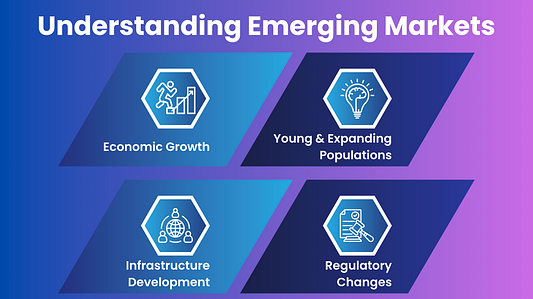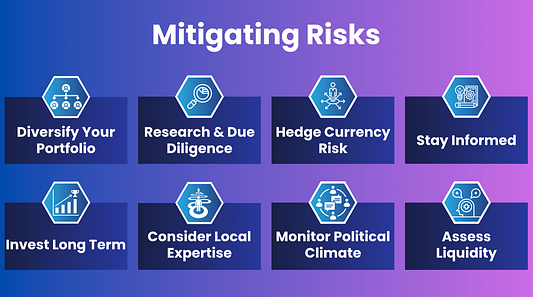Navigating your way through potential prosperity and pitfalls
Investing in emerging markets can be an exhilarating adventure, akin to traversing uncharted territory.
These markets — often found in less developed economies — offer high returns but come with increased volatility.
While the potential for significant gains is undeniable, it is crucial to tread cautiously and understand the landscape before diving in.
In this article, we will look at the world of investing in emerging markets, explore the potential rewards, and discuss strategies for mitigating the inherent risks.
Understanding Emerging Markets
Emerging markets — also known as developing or less developed markets — encompass countries that are in the process of rapid industrialisation and growth.
They are typically characterised by the following:

Economic growth:
Emerging markets exhibit robust economic growth, often outpacing developed nations.
This growth potential is a major attraction for investors seeking high returns.
Young & expanding populations:
These markets often have youthful populations — which can translate into a growing workforce, increased consumer spending, and greater market potential.
Infrastructure development:
Emerging markets frequently invest in infrastructure projects — such as transportation, telecommunications, and energy, to support their economic growth.
Regulatory changes:
Governments in emerging markets may enact reforms to attract foreign investment — which can create opportunities for investors.
Potential Rewards
Investing in emerging markets offers the potential for substantial rewards.
The following are some of the key advantages:
High growth potential:
Emerging markets can experience rapid economic expansion — resulting in impressive returns on investments.
Diversification:
Including emerging market assets in your portfolio can enhance diversification — reducing the overall risk of your investments.
Untapped markets:
These markets often offer access to consumers and industries that may not be readily available in developed economies.
Yield opportunities:
Emerging market bonds and dividend-paying stocks can provide attractive yields compared to their counterparts in developed markets.
Increased Volatility
While the rewards can be tempting — it is important to recognise that investing in emerging markets comes with heightened volatility and risks:
Political instability:
Emerging markets may be susceptible to political instability — which can lead to sudden policy changes or unrest that affects investments.
Currency risk:
Exchange rate fluctuations can impact the value of your investments — especially if the local currency depreciates.
Regulatory uncertainty:
Regulatory environments in emerging markets can be unpredictable — leading to changes that affect the business landscape.
Liquidity concerns:
Some emerging markets may have less liquid financial markets — making it challenging to buy or sell assets when needed.
Mitigating Risks
To navigate the treacherous waters of emerging markets successfully — consider these strategies for mitigating risks:

Diversify your portfolio:
Do not put all your eggs in one basket.
Spread your investments across different emerging markets and asset classes to reduce risk.
Research & due diligence:
Invest time in thorough research.
Understand the political, economic, and social dynamics of the specific market you are interested in.
Hedge currency risk:
Consider using currency hedges or investing in assets denominated in stable currencies to protect your investments from currency volatility.
Stay informed:
Keep up with local and global news to stay informed about potential risks and opportunities.
Invest for the long term:
Short-term fluctuations are common in emerging markets.
Adopt a long-term perspective to ride out the volatility.
Consider local expertise:
Collaborate with local experts or employ professional fund managers who have a deep understanding of the market.
Monitor political climate:
Stay vigilant about political developments that could impact your investments.
Political stability is often crucial in emerging markets.
Assess liquidity:
Evaluate the liquidity of the market and asset class you are investing in.
Ensure you can exit your investments when necessary.

In conclusion, investing in emerging markets can be a rewarding endeavour, offering the potential for high returns and diversification.
However, it is not for the faint-hearted.
The high reward potential is matched by increased volatility and risks.
To thrive in these markets, arm yourself with knowledge, diversify your portfolio, and stay adaptable.
If you are prepared for the ride, the high rewards of investing in emerging markets can make it a worthwhile pursuit.
Happy investing!
If you would like to know more about finance and investing, feel free to check out the following list:
As always, if you have any other questions or thoughts, please feel free to add them to the responses section.
If you would like to stay connected, check out my website or follow me on my socials Linkedin & Instagram.
This article is for informational purposes only. It should not be considered Financial or Legal Advice. Not all information will be accurate. Consult a financial professional before making any major financial decisions.

